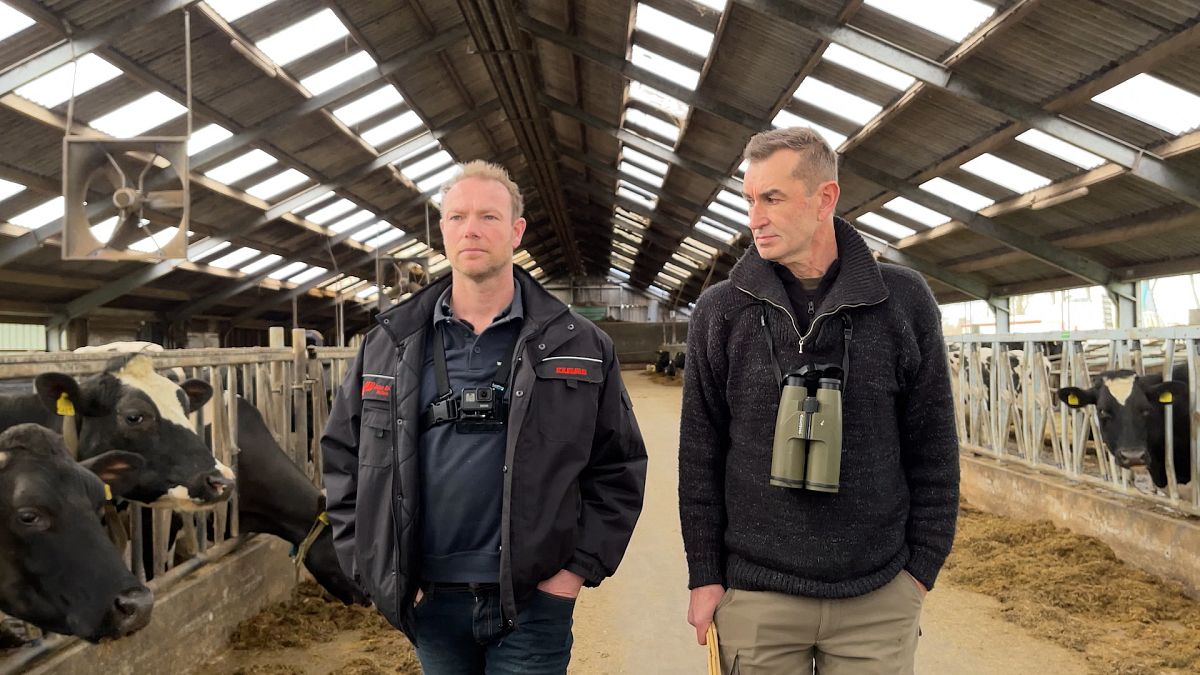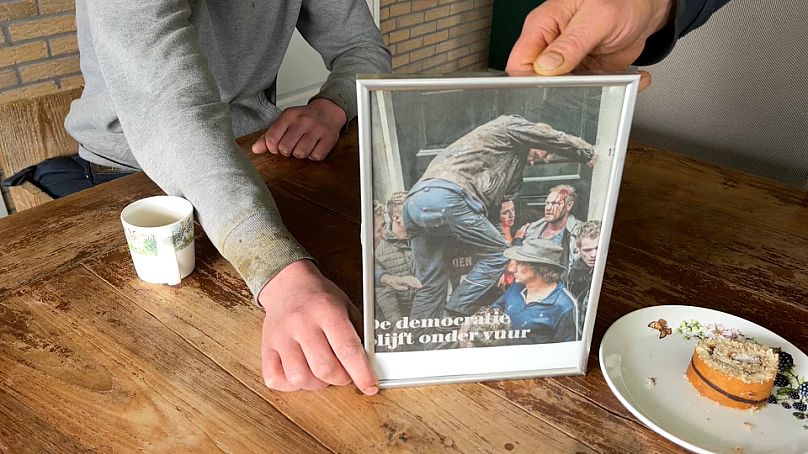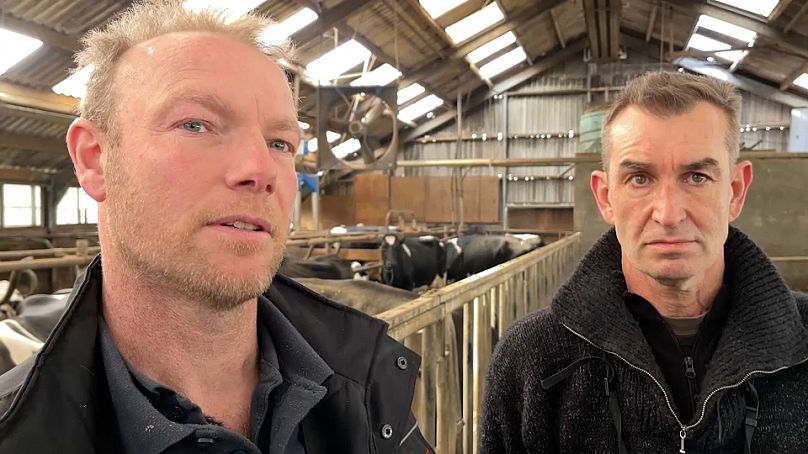In this latest episode of Euronews Witness, we travel to the Netherlands where many farmers are opposing government plans to drastically reduce livestock in order to slash nitrogen emissions, a major source of pollution in the country.
A few days after Euronews Witness aired this special report on angry Dutch farmers and the nitrogen battle devastating the political landscape in the Netherlands, the European Commission (on May 2) gave the green light to a €1.47 billion support package designed by the Dutch government to buy-out and close some 3,000 farms close to nature reserves. This voluntary buy-out scheme targets the top polluting small to medium livestock farmers and is part of a larger scheme to reduce soaring nitrogen emissions in the Netherlands.
The Veluwe nature reserve, lying in the green heart of the Netherlands, is a vast expanse of heathland and wooded groves.
The area is protected under an EU conservation initiative, and at first glance, it seems to be an unspoiled haven for wildlife. But dig a little deeper, and you’ll find a less idyllic reality.
Veluwe is an area saturated with ammonia and nitrogen, primarily coming from surrounding farmland. The coarse, dull grass that covers the park thrives due to pollution, which increases soil acidity, but it is choking more fragile species as it spreads. In turn, this changing habitat is threatening the biodiversity of birds and insects.
Back in The Hague, the political landscape is going through its own painful transition, as the government squabbles over plans to reduce nitrogen pollution. Prime Minister Mark Rutte hopes to halve emissions by 2030, a plan that cost him support in last month’s provincial elections.
Euronews’ Hans von der Brelie has been to the Netherlands to bring you this story.
A farmers' revolt?
The Netherlands is the second largest agricultural exporter in the world, a ranking that is both a source of pride and a cause for concern.
The sector is responsible for around half of the country’s nitrogen emissions, as this element can be found in fertilisers and animal excrement.
The transport and construction industries also contribute to this build-up, but farmers remain firmly at the forefront of the debate.
In 2019, the Netherlands’ highest administrative court found that the Dutch government’s plan to reduce nitrogen emissions was not in line with targets, meaning it violated EU law.
Efforts to curb nitrogen have since intensified, with farmers being encouraged to innovate and alter their way of working. Most experts believe that cutting livestock numbers is the answer, whilst others have suggested reducing the amount of protein in cattle feed or diluting manure with water.
Last November, the government offered to buy up to 3000 of the most heavily polluting farms, and the Nitrogen Minister Christianne van der Wal said she was not ruling out forced purchases
Omgo Nieweg, a farmer in the Northern village of Adorp, has participated in protests against the state’s new strategy.
"The problem is that the Dutch government doesn’t give us a clear perspective for the future. But we need perspective to carry on with our work," he told Euronews.
Since the government’s initial announcement in 2019, many farmers have been taking to the streets to express their anger, often blocking roads and public spaces with tractors.
"There’s more fear now", Omgo admits. "It’s not really nice to get out of bed to milk the cows when your thought is: what's the next week [going to look like]?"
The government has earmarked €7.5 billion for the buyout scheme, part of a larger €24.3 billion nitrogen plan, but this is awaiting EU approval. Some fear that it could be considered illegal state aid.
From the fields to the ballot box
An offshoot of the farmers’ protests is the BBB party, or the ‘Farmer–Citizen Movement’.
Appealing to rural voters who feel misunderstood by the establishment, the party won big in last month's provincial elections, gaining around 16 per cent of the vote.
This came as a blow to the ruling, centre-right coalition government, which is expected to lose eight of its 32 seats in the Senate.
Raoul du Pré, the chief political editor of the Dutch paper de Volkskrant, told Euronews: “Partly it's the same populist movement that we have had for the last 20 years, [...] And partly it is the outcome of a building feeling in the last few years in the rural regions that they [do not wish to be] taken for fools in The Hague.”
He says that the BBB doesn’t have the power to override EU law, but it can still hinder efforts to reduce emissions. “Are we going to take measures this spring, this summer, this year? Or are we going to take another four or five, six years to do it - like we have done in the last three years? Because not very much has happened since 2019 when our highest court said that it had been enough.”
One of those pushing back against the government’s nitrogen strategy is Eddie van Marum, a friend of Omgo and a recently elected member of parliament for the BBB.
“The system is not right”, Eddie says. He hopes that the state will put more money into alternative conservation initiatives.
Along with Omgo, he has been adapting land to protect bird species, notably lapwings and black-tailed godwits. “These are the species the EU wants to conserve. Actually, this is not giving the farmer money. It's costing the farmer money,” Eddie told Euronews.
Eddie is also against the government’s approach to measuring nitrogen emissions.
Currently, those involved in nitrogen producing activities must obtain a permit if they are operating within 25 kilometres of a protected nature reserve.
“It's not even clear if this emission is landing on a nature reserve 25 kilometres away’, Eddie argues. ‘It's all in a calculation model and it's not in actual measurements in the field.”
Roy Wichink Kruit, a government air quality inspector, nonetheless assured Euronews that the system is extensive and accurate.
“We have over 300 measurement locations in the Netherlands. [...] it's the most dense measurement network in the world.”
The Dutch Council of State also defended the permit system earlier this month.
Environmentalists had requested the extension of the 25-kilometre permit radius on the basis that nitrogen oxides can actually travel many hundreds of kilometres away from their source.
The advisory body said that increasing the distance would be too logistically complicated and detrimental to industries in the Netherlands.
Brussels stands firm
Despite the BBB’s success and calls to push back emissions targets to 2035, Brussels has been urging the Dutch cabinet to stick to its commitments.
A spokesperson for the European Commission told Euronews that infringement procedures will not be ruled out if EU legislation is breached.
"As with any enforcement of EU law, when national authorities do not properly address a situation, the Commission may be compelled to take action."
The Commission’s spokesperson nonetheless stressed that these measures are not currently necessary and that the body wishes to "support the Dutch authorities to achieve the biodiversity and zero pollution objectives set out in the Green Deal".
Watch Hans von der Brelie's full report in the video player above.


